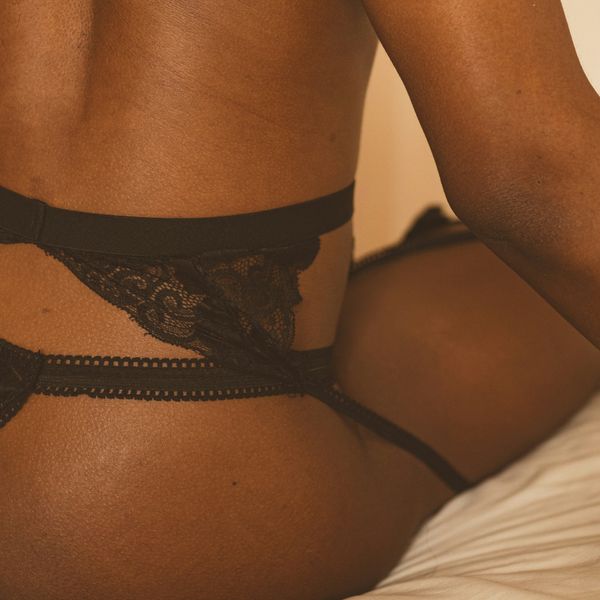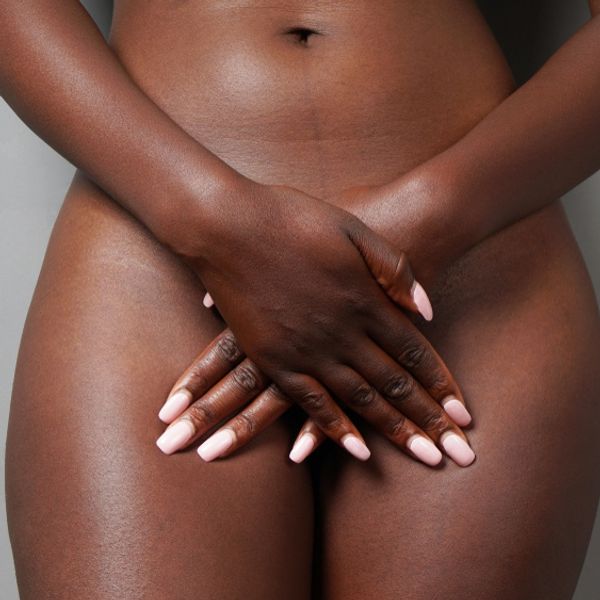
In order to be successful in life, we need to prepare ourselves for just about anything, right? So, just in case you happen to get a call to be a contestant on Jeopardy and then, just in case one of the categories is "vagina" (which is the entry into the body; the outer part is our labia), here are some random facts that you should know.
The word vagina is Latin for "sheath"; a sheath is a covering for a sword or dagger. Hmm…remember in the song "Rump Shaker", there's a line that says, "Now since you've got the body of the year, come and get the award. Here's a hint—it's like a long, sharp sword"? Welp. (By the way, the hymen is named after the Greek goddess of marriage.)
Most of the nerve-endings in our vagina is located within the first 1-2 inches of it. The average penis is 5" when it's erect. So no, you don't need a man who's "packin'" in order to have a really good time. That's a (media) myth. You'd be far better off with someone who knows what he's doing—"average" or not.
While the hair on our head can grow for seven years, our pubic hair grows for no more than three weeks before a new cycle starts. And yes, pubic hair serves a purpose—it can protect us from bacteria, serve as a cushion from friction and abrasions, and it also decreases our chances of getting an STD since shaving or waxing could leave sores behind and make us susceptible to them (if the person we're sleeping with is infected).
These are just some of the things that make our vaginas so fascinating. Hands down, they are super special (just look at what men go through just to get close to one!). Still, sometimes we don't give our "passion flowers" (a popular nickname for it) the kind of attention that it deserves.
So, in honor of knowing that our vaginas could probably stand to get some extra TLC, here's what my research revealed that a lot of us could probably stand to do more often for/to it:
1.Wear Cotton Underwear

First up, if you've got any panties in your collection that are older than 6-12 months, you should toss 'em. There is bacteria (plus about one-tenth gram of feces) that could still be in your underwear that could lead to irritation.
When you head out to buy some new ones, it's best that they are made out of cotton (organic cotton, if you can); high-tech polyester comes in as a close second. Since they're the kind of fabric that breathe and absorb liquid, they significantly decreases your chances of having a yeast infection.
If you're thinking this means that you have to go without thongs, well, it is important to do all things in moderation (thongs tend to be pretty tight). But so long as you're wearing a size that actually fits and they also are made out of cotton (100 percent cotton), you should be all good.
2.Wash Your Undies by Hand
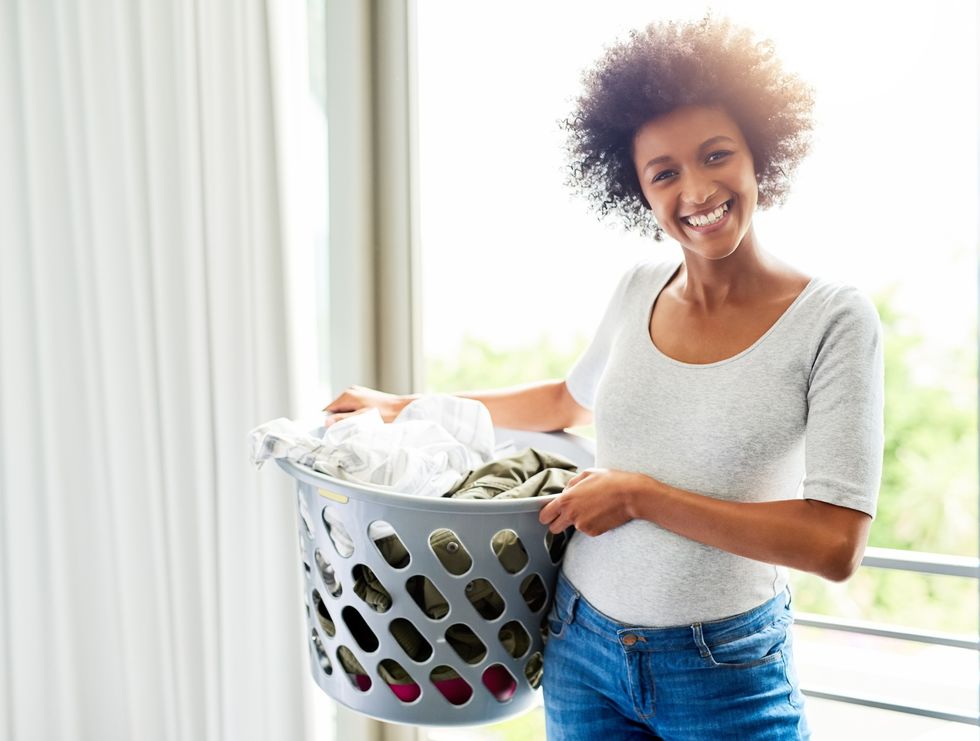
Getty Images
Tossing your underwear into the wash with the rest of your clothes may be quicker and easier but it's kinda wreaking havoc on them at the same time. It really is best to wash your undies by hand in the sink with a hypo-allergenic detergent.
If you'd still prefer to use your washing machine, cop a few mesh bags to put them in, set your machine to hot when cleaning them. Oh, just to be extra safe—before putting your panties in, put about a ½ cup of bleach into the machine and let it run a full wash cycle in order to sanitize it.
3.Take a Probiotic
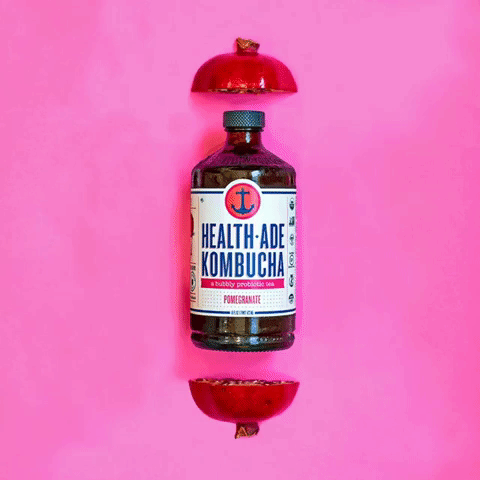
When it comes to vaginal health, it's always a good idea to take a proactive approach. One of the best ways to keep yeast and bacterial infections at bay is to take a probiotic on a daily basis. It's what maintains "friendly bacteria" in our gut and vaginal tract while also keeping our pH levels in check.
When shopping for a probiotic, make sure that it contains lactobacillus, bifidobacterium, or saccharomyces boulardii in it (preferably all three). It also needs to contain at least one billion forming colony units in it (it'll say so on the bottle).
If you've never taken a probiotic before and, at first, you feel gassy or your stool patterns shift, generally that's nothing to worry about. It simply means that the probiotics are taking effect.
As far as probiotic foods go, yogurt definitely tops the list. Also, fermented foods like pickles, sauerkraut, kombucha, miso soup and brine are good. So is dark chocolate (the kind that contains 70 percent or more cocoa).
4.Also Take Some Omega-3s
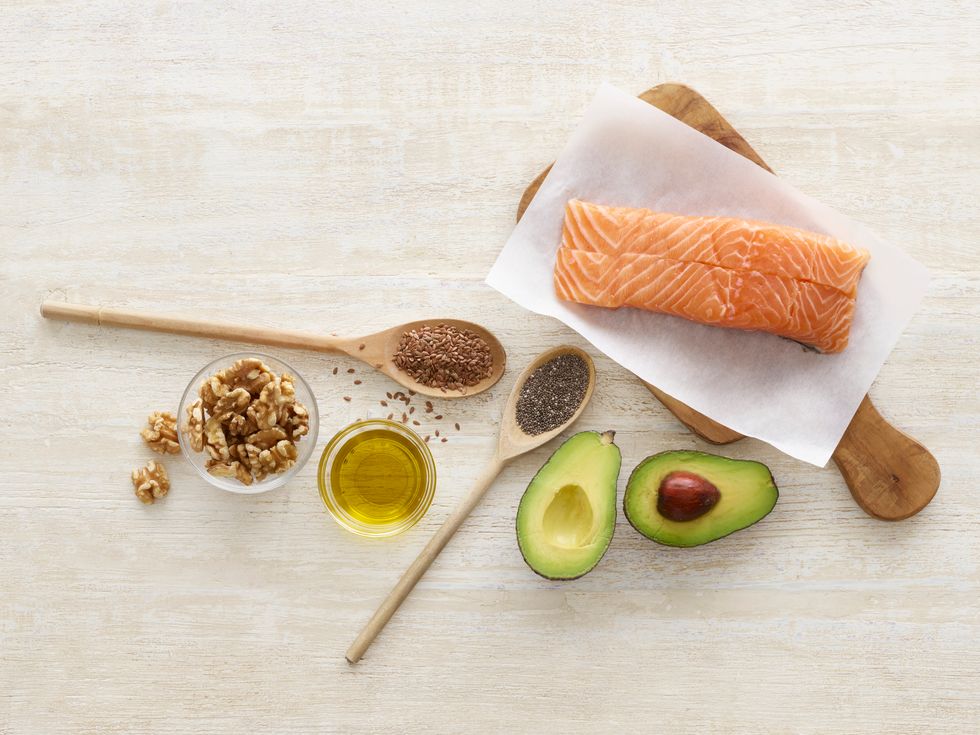
Getty Images
Something else that your vagina needs is healthy dosages of omega-3 oil. The acids in them help to increase blood circulation, even down in the genitalia region. You know what that means—more orgasms! Also, if a shift in your hormones has led to vaginal dryness or even atrophy, omega-3 can soothe your labia's skin and even help to restore lubrication.
Taking a daily supplement is a good idea. Also, foods that are really high in omega-3 include walnuts, salmon, sardines, pastured eggs and spinach.
5.Do Kegel Exercises
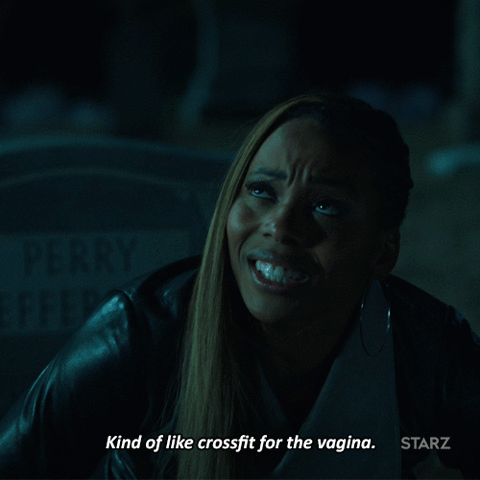
What is such a big deal about kegels? Your bladder, uterus, rectum and yes, even your vagina are all encased in what are known as your pelvic floor muscles. Kegels are what help to keep them nice and strong. The stronger they are, the more support your back and hips will get; the less you'll have to worry about a leaky bladder; the quicker your pelvic region can bounce back after childbirth and the easier it will be to not only have orgasms but intensified orgasms (yes!).
If you've never tried kegels before, you can learn more about it here. If you'd like to try it with a Yoni egg, there's a sistah that breaks that down here.
6.Make Your Own Lube
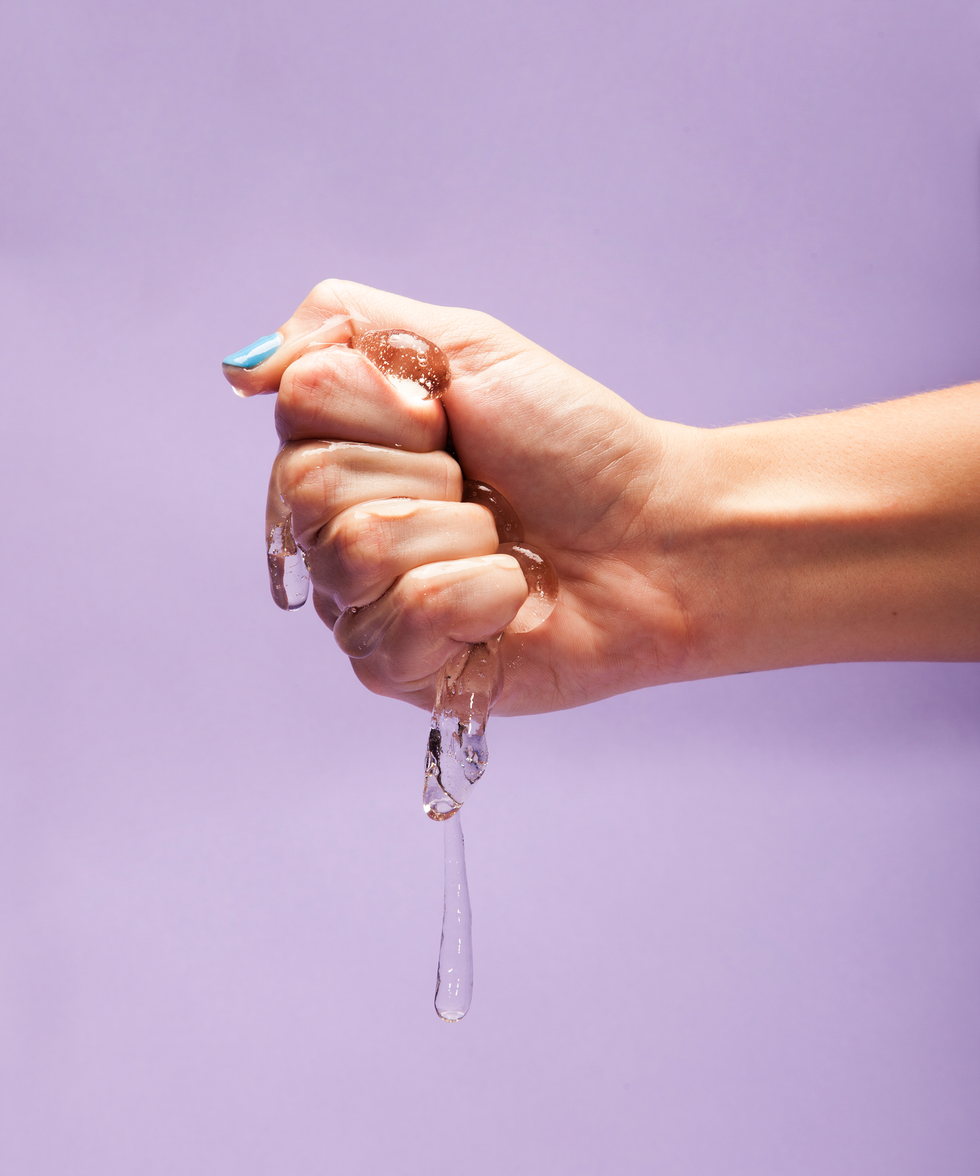
Megan Madden/Getty Images
Sex is great. Really great. But sometimes the friction that comes from having it creates little micro-tears in our urethra and vagina. Whenever that happens, it leaves us susceptible to infection. We're more vulnerable to this happening if our vagina is dry.
If you need a little extra help staying wet down there, either purchase a water-based lube or, even better, make some of your own. You can get your hands on an all-natural recipe here.
7.Occasionally Check Your Clitoris
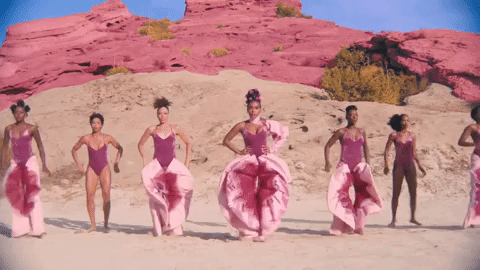
One time I read a story that took a good two weeks to get out of my head. A woman said that she let her pubic hair get so long that some of it got caught up into her clitoral hood and caused it to swell so big and hurt so much that she decided to have her hood removed. Eww and ouch.
My takeaway was to check my own clitoral hood more often. Not so much for hair but dry skin, left behind discharge, etc. A couple of times, I did find a few things lingering, so I did some research on what I needed to do to remove it.
All you need is to dab a Q-tip into some olive or sweet almond oil and gently rub it around your hood. If you do it right after washing your vagina, it should easily dislodge anything that may be caught up in it. The more you know, chile.
8.Bathe. Differently.
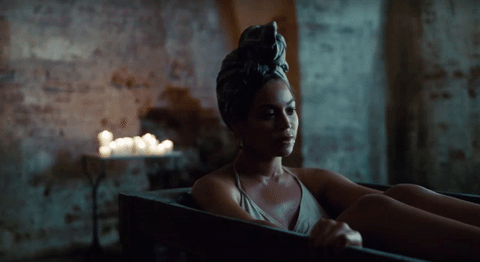
There's nothing like soaking in a hot bath with a candle, some wine and 90s R&B for at least an hour. On some levels, it's really good for our health. Soaking in warm water can increase our blood circulation, expand our lung capacity (making it easier for us to breathe), calm our nervous system, soothe our joints and muscles and even help to balance out our hormones.
But when it comes to our vaginas, it comes with its own set of pros and cons. On one hand, if you put nothing in your water other than baking soda or apple cider vinegar (if you need to balance out its pH levels), it could be good. But all of the bubble bath products combined with your vagina's pores being open due to the water, could irritate your vagina; it might even cause a vaginal infection.
Bottom line—shower as much as you bathe and, for the sake of your vagina, try and keep all of the "extras" out of the water when you choose to soak in the tub.
Oh, and try and avoid rubbing your vagina with a terry cloth towel when you get out. Your vulva (the external opening of your vagina) is super sensitive and that could irritate it. Pat dry instead.
9.Sleep Naked

Getty Images
There are all sorts of reasons why sleeping naked as often as possible (so long as you bathe daily and change your sheets weekly) is a good idea. It lowers your body temperature by activating brown fat and stimulating your metabolism. It decreases the stress hormone cortisol while raising the sleep-inducing hormone melatonin so that you can sleep more soundly. If you're not sleeping alone, the skin-to-skin contact that comes from being next to your partner raises the oxytocin levels in your body, which makes you feel safer (hornier too).
And yes, it's just one more thing that is great for your vagina. Remember, your va-jay-jay is cooped up in a pair of undies for hours at a time each and every day. It's pretty warm and wet down there, making it the ideal breeding ground for bacteria and infections. Sleeping naked all night gives your vagina time to air itself out, decreasing the chances of it getting "sick."
10. Love Your Vagina (and Labia)—Just the Way It Is
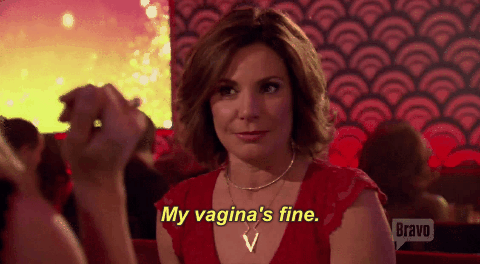
A couple of years ago, it was reported that vaginoplasty (a vaginal reconstruction procedure) went up 39 percent. As someone who used to work with a ministry that deals with the porn industry, for the most part, I think that's sad. I say that because I've literally heard women say, "I want a vagina like Jenna Jameson or Sara Banks."
Think about how insulted you would feel if someone who loved you said, "You'd be prettier if you got plastic surgery." While your vagina can't use words, I think it would be insulted if we tried to change it.
As far as vaginas go, each one has its own look and scent and, so long as it's healthy, there's nothing wrong with that. Out of all of the things that your vagina needs you to do, make sure that loving it, just the way that it is, tops your list.
When you think about all that it does for us, it's truly extraordinary. No changes needed.
Did you know that xoNecole has a new podcast? Join founder Necole Kane, and co-hosts Sheriden Chanel and Amer Woods, for conversations over cocktails by subscribing to xoNecole Happy Hour podcast on Apple Podcasts and Spotify.
Featured image by Shutterstock
Originally published on March 20, 2019
- Clitoral Hood: What It Is & Why You Should Love It - xoNecole: Women's Interest, Love, Wellness, Beauty ›
- 8 Best Probiotic Sodas Of 2023: Good Gut Health, Kombucha - xoNecole: Lifestyle, Culture, Love, Wellness ›
- 19 Ways To Take Better Care Of Your Vagina ›
- 8 Rules for a Healthy & Normal Vagina | Everyday Health ›
- Postpartum Care: Vagina After Birth ›
- A gynaecologist's guide to good vulva and vagina health - Health ... ›
- Keeping your vagina clean and healthy - NHS ›
- Postpartum care: After a vaginal delivery - Mayo Clinic ›
- 9 Tips to Keep Your Vagina Happy + Healthy – Health Essentials ... ›
- Vagina Health - 10 Tips To Keep Your Vagina Healthy And Happy ›
This Is How To Keep 'Holiday Season Stress' From Infecting Your Relationship
Hmph. Maybe it’s just me, but it seems like there is something really weird happening in the fall season air (because winter doesn’t officially begin until December 21) that cuddle season is in full swing while break-up season is as well. In fact, did you know that break-ups are so popular during the holiday season that December 11 is deemed Break-Up Day?
The reasons why relationships shift around this time vary; however, I did both roll my eyes and chuckle when I read that a very popular one is because it’s an easy way to get out of getting one’s significant other a Christmas present. SMDH.
Anyway, I personally think that the less shallow folks out here may contemplate calling things “quits” or they at least distance themselves a bit from their partner (and what I’m referring to is serious relationships) due to all of the stress and strain that oftentimes comes with the holidays whether it be financial, familial, due to their tight schedules or something else.
Listen, I would hate for you and your man to miss the fun and happiness of experiencing this time of year, all because you are so overwhelmed or irritated that you can’t really enjoy it. That’s why I have a few practical tips for how to avoid allowing the typical holiday season stress from INFECTING your relationship.
Manage Your Expectations
 Giphy
GiphyUnmanaged expectations. If there is a main reason why the holiday season tends to be so stress-filled for so many people, I’d bet good money that this is the cause. And when you’re in a long-term relationship, expectations can manifest themselves in all sorts of cryptic and/or unexpected ways. You might have relatives who assume that you are going to be with them for Thanksgiving or Christmas when you have other plans in mind. You might be thinking that you are going to spend one amount for presents while your man is thinking something totally different. When it comes to scheduling, your signals may be crossed.
And you know what? To all of these scenarios, this is where clear and consistent communication come in. Don’t assume anything. Don’t dictate anything either. From now until New Year’s, mutually decide to check in once a week, just to make sure that you are both on the same page as it relates to the holidays and what you both are thinking will come along with it. The less blindsided you both feel, the less stressed out you will be. Trust me on this.
Set (and Keep) a Budget
 Giphy
GiphyOkay, so I read that last year, 36 percent of Americans incurred some type of holiday-related debt. Hmph. Last year, there was still some sense of normalcy in this country, chile, so I can only imagine what finances are gonna look like over the next several weeks. That said, since I don’t know a lot of people who don’t find being broke stressful, make sure that you and your bae set a budget and then stick to it this year — no ifs, ands or buts.
Because really, y’all — it doesn’t make sense to deplete savings and/or max out credit cards for a few days of giggles only to be damn near losing your mind because you don’t know how to make ends meet come Dr. Martin Luther King, Jr. Day.
And by the way, this tip doesn’t just speak to things like food and gifts; I also mean travel. If it doesn’t make a ton of sense (or cents) to be all over the place this year — DON’T BE.
Keep Matthew 5:37 at the Forefront
 Giphy
GiphyIf off the top of your head, you don’t know what Matthew 5:37 says, no worries, here ya go: “But let your ‘Yes’ be ‘Yes,’ and your ‘No,’ ‘No.’ For whatever is more than these is from the evil one.” That verse right there? Oh, it’s a boundaries lifesaver! I say that because do you see “maybe” or “I’ll think about it” in there? Nope. LOL. It says that you should tell people “yes” or “no” and leave it at that — and that complements Anne Lamott’s quote, “’No’ is a complete sentence” impeccably well. Yeah, you’ve got to remember that anything beyond a yes or no to a request is privileged information; you don’t owe anyone details or an explanation.
Besides, if you are really honest with yourself, when someone asks you something and you give a “Umm, let me think about it” kind of reply, more times than not, you already know what your answer is going to be — so why not let you both off of the hook? Give your response. Commit to that. And let everyone (including yourself) get on with their lives and schedules.
I promise you that when it comes to those holiday parties, you are pissing more folks off by not RSVP’ing or doing so and not showing up than just saying, “Thank you but not this year” off the rip.
Remember That Your Personal Space Is Privilege Not a Right
 Giphy
GiphyA friend of mine recently bought a new house and invited me over to come see it. He’s a single man with no children, so as I was taking in all of the space that he had, especially as I walked through his finished basement, I joked about relatives coming to live with him. “Hell no” and “absolutely not” were pretty much his immediate responses as he went on to say that some folks even had the nerve to be offended when he told them that he had no intentions on taking DNA in.
Ain’t it wild how people think that your stuff is their right? And yes, that brings me to my next point. Your home is your sanctuary space. If you want to host folks this year — cool. If not, ALSO COOL. Please don’t let folks (family included) guilt you into how they want you to act or even into what they would do if the shoe was on the other foot. You are not them — and as one of my favorite quotes states, “If two people were exactly alike, one of them would be unnecessary.” (A man by the name Larry Dixon said that.)
Hell, my friends? They know that I am good for sending them random things that they need or even want all throughout the year. Coming over to hang out at my pace, though. Uh-uh. Chalk it up to being a card-carrying member of the ambivert club yet I like keeping my living space personal — and I sleep like a baby, each and every night, for feeling that way.
Always remember that your space, your time, your resources, your energy and shoot, yourself period (including your relationship), are all things that are your own. You get to choose how, when and why you want to share them. The holiday season is certainly no exception.
Cultivate Some “You Two Only” Traditions
 Giphy
GiphyIt’s not uncommon for some couples to hit me up after the holiday season to “detox.” Sometimes it’s due to the financial drama (and sometimes trauma) that they experienced. Sometimes it’s because they allowed their relatives (especially in-laws) to get more into their personal business than they should’ve. More than anything, though, it tends to be because they didn’t get enough quality time together and so ended up feeling “disconnected.”
Please don’t let that happen. Listen, I’m not even a holidays kind of woman and yet, I will absolutely sit myself down with some hot chocolate and chocolate chip cookies to enjoy a Hallmark holiday film or two. Aside from the fact that most of them are lighthearted and sweet, I also like that they usually focus on couples loving on each other amidst all of the holiday beauty and ambiance — which is something that all couples should set aside some time to do.
Maybe it’s a vacation. Maybe it’s a staycation. Or maybe it’s my personal favorite, A SEXCATION. Whether it’s for a few days, the weekend or even overnight — don’t you let the holidays go by without setting aside time for you and your man to celebrate one another. Don’t you dare (check out “Are You Ready To Have Some Very Merry 'Christmas Sex'?”).
GET. SOME. REST.
 Giphy
GiphyI once read that 8 out of 10 people get stressed out over the holidays and 3 out of 10 lose sleep during to it — and when you’re stress-filled and sleep-deprived, that can absolutely lead to hypersensitivity, making mountains out of molehills and even not being in the mood for sex.
Your relationship can’t afford to go through any of this, so definitely make sure to prioritize rest. I don’t care how unrealistic it might seem during this time, sleep should never be seen as a luxury; it will always and forever be a great necessity.
That said, try to get no less than six hours of shut-eye in (check out “6 Fascinating Ways Sex And Sleep Definitely Go Hand In Hand”) and even ask your bae to take a nap with you sometimes (check out “Wanna Have Some Next-Level Sex? Take A Nap, Sis.”). Not only will sleep help to restore your mind, body and spirit but, when it’s with your partner, it’s an act of intimacy that can make you both feel super connected, even in the midst of what might feel like chaos.
___
Holiday season stress is real. Still, never give it the permission or power to throw your relationship off. Put you and your man first and let the holidays be what they are gonna be, chile.
Let’s make things inbox official! Sign up for the xoNecole newsletter for love, wellness, career, and exclusive content delivered straight to your inbox.
Featured image by Shutterstock
How To Avoid Being An Emotionally Impulsive Spender This Holiday Season
Geeze. Can you believe that we are just a few days out from another Christmas? Yeah, me neither. In fact, because I’m not a holidays person myself (check out “So, What If You Don't Observe Holidays?”), it wasn’t until one of my clients was venting about how stressed out she was due to all of the holiday season procrastinating that she had been doing that I realized just how fast December is actually flying by.
If, like her, you’re feeling frazzled because, although you told yourself last year that you weren’t going to wait until the last minute to “handle your business,” you ended up doing exactly that, fret not. I’ve got 10 tips that can keep you from making emotionally-triggered decisions as far as your financial expenses are concerned. Merry Christmas. #wink
1. Create a Budget. Stick to It.
 Giphy
GiphyBudgets, boy. I recently read that one of the reasons why they don’t work for a lot of people is because many folks don’t have a clue about how much money they spend on a monthly basis to begin with. SMDH. That said, at the end of the day, it’s important to remember that a budget is simply setting boundaries/limits on your spending — and being intentional about moving in this fashion is always a wise move; especially when it comes to this time of the year…especially being that it’s typical for half of all Americans to take on some type of holiday season debt with 17 percent needing six (or more) months to pay it off.
Know what can prevent this kind of financial chaos? A SPENDING BUDGET. Tips for how to create one of your own this year can be found here.
2. Never Shop When You’re Stressed or Pressed
 Giphy
GiphyYou know how they say that it’s not a good idea to go grocery shopping when you’re hungry? Although the holiday season can be a stressful time, avoid shopping for gifts (or décor or food for recipes) when you are feeling stressed out or pressed for time. More times than not, that cultivates anxiety which could cause you to either purchase things that you don’t really want or to spend money that you don’t really have (P.S. If you’re relying on credit cards, that qualifies as money that you don’t really have. Just sayin’).
3. Don’t Keep Up with the Joneses
 Giphy
GiphyKnow something else that can stress you out: trying to keep up with the Joneses. And y’all, now that we have social media, the reality is that envy is at an all-time high. That’s because it can be really easy to watch holiday engagements, holiday trips and folks bragging about the things that they’ve received in times past, only for you to find yourself wishing that you were them — or putting pressure on yourself and those in your world to keep up.
Listen, it is King Solomon who once said, “So are the ways of everyone who is greedy for gain; It takes away the life of its owners” (Proverbs 1:19 — NKJV) and “A sound heart is life to the body, but envy is rottenness to the bones” (Proverbs 14:30 — NKJV) and he’s considered to be the wisest man who ever lived (during his time — I Kings 4:30). Yeah, both of these verses are a spiritual reminder that whatever you are planning to do or give, do it out of the goodness of your heart — not so that you can low-key “outdo” the next guy.
4. No Need to “Tit-for-Tat”
 Giphy
GiphyThis one might be a bit controversial yet I’m totally okay with that. I don’t care what the occasion is, no one is OWED a present. A gift is a voluntary token of one’s appreciation or affection. That said, if you decide to give someone a present this year, don’t automatically expect something in return. If you get something, cool. If not, if you were giving for the right reasons, it really shouldn’t matter (RIGHT?). On the flip side, if someone decides to get you something and you don’t have something to offer in return, also cool.
Other than going to someone’s home for a holiday dinner or party, for anyone to feel like they should have something in hand because someone else does…that’s not giving, that’s competing — and that absolutely should not be the spirit that you are in (or around) during this time of year.
Again, a gift is not an obligatory thing. If you’ve always thought otherwise, it’s time to do some serious reprogramming.
5. Avoid the Pressure to Buy for Lots of Adults
 Giphy
GiphyLast month, Newsweek published an article that said it’s wise to not spend a ton of money purchasing gifts for adults. A financial expert in the piece said that it’s best to buy for kids because, more times than not, you’re going to get adults something that they already have a lot of, they don’t really need or they’re not going to use (beyond maybe regifting) anyway.
If you’re not feeling that insight, my take would be to exchange names and set a price cap for the grown folks. I say that because, I don’t think that people ever outgrow wanting something over Christmas. It’s just that the over-the-top energy should be reserved for the kiddies — and even then, the “4-gift rule” (want, need, read, experience) is probably your best bet for them…financially and otherwise.
6. Go for Thoughtful over Expensive
 Giphy
GiphyIt’s kind of wild how much close-to-torture folks send themselves through to purchase gifts that, a good 6-8 months now, most folks aren’t even going to remember. That’s why it’s also a good idea to purpose in your mind to get something thoughtful over expensive.
Honestly, that’s a big part of the reason why Etsy continues to be a go-to for gifts (for every occasion) for me. It’s because you can oftentimes get things customized/personalized which ends up meaning so much more to people than something that you bought at a generic department store that might have a high price tag yet still lacks in sentimentality and deep meaning.
7. Use Coupons and Promo Codes
 Giphy
GiphyCoupons (and promo codes) are a slippery slope in the sense that…they remind me of when I used to go overboard while thrift store shopping. I say that because, just because I might find several bomb dresses for under $20, what am I going to do with 50 of ‘em (over time)? It’s just as much of a waste of money as buying couture if neither option gets much use.
And that’s kind of the thing about coupons and promo codes. Some people end up overspending because they rationalize that so long as there are discounts attached, it’s all good. At the same time, this doesn’t mean that you should forego coupons and promo codes altogether. The key is to put together your shopping list (and budget) and then use discounts specifically for those items. If you do this, you could save well over $1,000 annually (at least, depending on what you decide to buy).
8. Avoid Add-Ons
 Giphy
GiphyYeah. Dodge add-on expenses. Add-ons like what? The first thing that comes to my mind is a warranty. What’s the chance that someone is actually going to need that? Another example is paying for things to be “professionally” gift wrapped. Chile, throw that stuff in a gift bag with some tissue paper and go on about your day. All good.
9. Rethink Gift Cards
 Giphy
GiphyIf there is any time of the year when there is a noticeable hike in gift card purchases, now would be it. And although they are a convenient approach to gift giving, at the same time, many come with hidden fees, the full amount oftentimes goes unused (which ends up being a waste of money) and they do come with expiration dates that are oftentimes forgotten.
So, if you’re someone who likes to wait until the last minute to do your holiday shopping, resist the urge to impulsively pick up a handful of gift cards. Unless it’s to a place that you know someone is going to use within the next few months, they could end up in somebody’s kitchen drawer for the next couple of years. And what a waste that would be.
10. They’ll Get It When They Do. And That’s Okay.

=
GiphyOne more. Although it is super thoughtful and proactive to get people their gifts in time for whatever occasion you purchased them for, if trying to reach that goal is going to require paying for rush shipping that is damn near as high as the price of gift or spending a lot of gas money that you don’t have at the moment to drive miles and miles away — take the pressure off to spend a ton of cash just to make sure that something arrives at December 25. Listen, through doing business with Etsy, I have learned that through this administration, there are all sorts of tariff issues going on and the USPS is slower than ever too, so paying more may not guarantee much.
The hack? Send a message that something special is coming…soon enough. The thought really is what counts (more times than not); plus, it builds anticipation of something good coming, even if it’s after all of the Christmas Day hoopla. And no one (with sense) is going to have a problem with that.
Now don’t you feel better? Happy Holiday Shopping, sis.
Let’s make things inbox official! Sign up for the xoNecole newsletter for love, wellness, career, and exclusive content delivered straight to your inbox.
Featured image by Shutterstock





